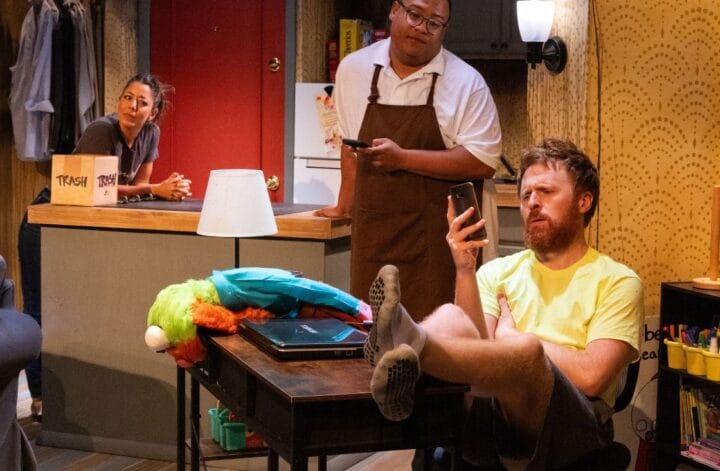If New York Times deputy editor of culture and lifestyle Melissa Kirsch finds herself suffering from “the blues” attributed to too many hours spent scrolling and watching digital screens (aware of the dangers of FOMO, she no longer checks out Facebook friends), where does that leave the rest of us? What Kirsch was watching – even those cute Instagram dog reels – didn’t matter as much as the quantity: her brain was simply overtaxed from constantly “consuming content” at the expense of live human interaction.
A friend offered a novel solution: “Engage with things that someone put a lot of work into.” In other words, ART. What makes me smile is her decision to see live theater. Here’s how she describes her “novel” experience attending “A Streetcar Named Desire” at the Brooklyn Academy of Music and sitting up close where “you can see Paul Mescal spit and sweat as he stalks the stage as Stanley Kowalski, an artist doing his work in real time and space.”
Now I’m grinning even wider, having but recently been similarly entranced by Tim Davis’s Stanley at New City Players’ local “Streetcar” production. In real, always original and unrepeatable moments of time, actors and their audiences are mutually energized by everyone being in the moment together… and totally alive. Live theater is that very special art form that thrives on community engagement.
Kirsch’s Times’ essay, called “Works of art.” appeared in my inbox on Saturday morning. On Sunday afternoon, I had the privilege of seeing a new theatrical work of art called THE IMPOSSIBLE TASK OF TODAY by Jeff Bower, running from April 5-20. (This world premiere received a fantastic reception at its first public reading at FAU Theatre Lab’s 2023 New Play Festival and is finally receiving a long-anticipated, full-scale production as the inaugural play of The Lab’s three-part Owl New Play Festival.)

Despite daily chaos, there are still times when the universe aligns. The subject of Bower’s play vividly illustrates some points of Kirsch’s latest opinion piece, though it digs far deeper and wider. Hurtling us into the fragile, damaged psyche of a man so brutalized by a senseless personal tragedy that he just-barely survives by locking himself away from the world and obsessively playing video games to escape his sad reality. We both witness and feel his anguish, PTSD-induced mental breakdowns, agoraphobia, and attacks of depression.
For a while, a long while – we’re talking five years! – Jack Jordan can barely manage the impossible task of getting through the day. Still he’s self-aware enough to want to shield his friends from his baser instincts. “I know the traits,” he says. “I’m depressed. I act like an asshole.” (Unbeknownst to him, his friends both recognize and sympathize with his suffering as they, too, have endured tragedies and tend to give him a pass when he’s acting up.)
Still they wouldn’t be there for him if there weren’t an inherent kindness and sweetness in Jack’s soul, despite his current circumstance. We can experience all the highs and lows of his journey back to “normalcy” thanks to playwright Jeff Bower, and the incredible actor that Theatre Lab’s producing artistic director Matt Stabile, who also directs this play, chose for the part of a traumatized high school teacher in his early 40s. All the highly experienced and acclaimed actors excel in their roles, but the drama is centered on Jack – a role stupendously performed by Iain Batchelor whose lengthy resume includes prestigious local theaters, top UK companies, along with popular BBC televised series. I’ve never felt the onstage trauma of mental illness as viscerally as when watching Batchelor’s anguished facial expressions and contorted limbs. In Theatre Lab’s small, stadium-seating-equipped theater, everyone can partake in an intimate, up-close experience.
We also come to care for Jack, along with his coterie of one old friend and two new (but regularly appearing) acquaintances. Maybe it’s because when we first meet Jack “cute.” Conversing via a Muppet-style puppet, he adds playfulness and humor to his Zoom classes with a young English-language student from China. Jack even sings an original ditty when Yo Yo (voiced by Sarah Sun Park) gets five stars and a gumball for a great job! Yo Yo adores her American online tutor, proudly shows off her latest drawings, like pink dragons, and later includes him in her sketches. With childish innocence and exuberance, she signs out of each lesson with “I love you Jack” while Jack, for most of the play’s 100-minute (no intermission) duration, will only have his puppet say good-bye. Leaving us to wonder if the word “love” had been erased from his vocabulary.

We get hints, here and there, but the root cause of Jack’s misery is exposed very slowly, layer by layer; we are only made fully aware of the full horror and repercussions of his condition at the very end. So I won’t reveal too much here. Jack’s journey and his manner of coping are indicative of a 40-something man of our times, but also unique to himself. Magic realism is fluidly utilized throughout; Bower creates a Kabuki-style character called The Dark as an outward manifestation of Jack’s psyche, especially his depression.
When Jack signs off from his teaching session with Yo Yo, The Dark instantly slides over, practically embracing him as he slouches in ennui and calmly leads him to the couch, placing the video game control in his hand to avert complete dissolution. In her role as The Dark, award-winning intimacy director Nicole Perry utilizes her skills as a dance choreographer with slinky high kicks and smooth ballet-like moves that sway her death-mask-like face and tattered black-gauze dress. As a visual representation of Jack’s ongoing black moods, she’s open to interpretation, but forms strikingly original projections of how a clinically depressed person tends to return to the familiar “comfort” of his negative mental state.
Finding it nearly impossible to complete ordinary, everyday tasks (we hear him lay out the 18 difficult steps involved in simply taking a shower), Jack clutches at a straw that will get him up and in shape. He’d ordered a Power Tower exercise machine weeks ago. but finds himself yet again on the phone, arguing for them to deliver up his seven flights of stairs. Jack’s regular Wednesday supermarket delivery arrives during the call; he pays the man extra to bring up his groceries and unload them into the fridge. But Frank Wallace (a perfect character portrayal by Anthony Blatter) draws the line at getting more personally involved when Jack insists he talk to the Power Tower people, thrusts his cellphone in his ear, then blames him for not convincing them to deliver his equipment.
In time, Jack and Frank share video games (mostly Jack’s classic 20-year-old editions). And while Frank refuses to serve as his quasi-therapist, he does recommend Jack see one, like he does, even online. (But Frank is younger and Jack is of the macho generation where seeking therapy is seen as a sign of weakness.) As time progresses and Jack misses his regular Wednesday delivery call, Frank decides to pay him a visit just to check up on him; he brings snacks and they hang out. And for a man who once asked: “Are we friends? I’ve got plenty of other options. YOU on the other hand …” he’s inordinately flattered when Jack finally elevates him to the “friend” category by asking him to deposit his cellphone in a small cardboard box marked “Trash” as soon he arrives – a habit automatically adhered to by Frank’s two female visitors.
Val Pena (Kaelyn A. Gonzalez) is the millennial building manager who’d taken over Jack’s position and is way over her head, anxious about her job but otherwise a delightful breath of fresh air. And Jack’s always there to help walk her through every maintenance crisis – if not physically, via his cell phone. Yes, Jack is still basically a nice and considerate person who shares his skills freely. We eventually learn that Val also found help with her personal issues through therapy. She feels a kinship with Jack’s situation and would maybe want something more to develop between them despite the age difference. And despite not liking any of the classic 1980s movies Jack keeps pushing on her. But he brushes her off.
Jack is also frequently visited by someone we first see, at first, as an old friend of his own generation. Vaishnavi Sharma rocks the multi-layered role of Lynne Lall. Lynne breezes into Jack’s messy studio, wrinkles her nose at his body odor, finds him a somewhat fresh tee shirt and proceeds to fold his laundry as part of her help with IT, which here stands for the day’s “Impossible Task.” Lynn is an activist whose speeches have gone viral on TikTok and feels obligated to help Jack survive because of a shared and, as yet unknown, history. They play his video games together, but she always wins with Jack coming in second. When she questions him about “letting” her win, he gets into a rant about how he would ever convince the international players they compete against to do so?
The playwright has experience with tragedy, notoriety, and depression. As far back as 2003 when he earned his Masters in Fine Arts at Florida Atlantic University, he’d received death threats after local newspapers put his picture on the front page under the headline “Gay Jesus Play Causes Stir” after his thesis production of Terence McNally’s “Corpus Christi.” Similarly, more recently, when he attended the inaugural LA March for Our Lives with his wife, an MSD alum of the school now notorious for the Parkland shooting massacre, they had alumni march up front. And then a guy with a video camera recorded their faces as a threat.
Like Jack, Jeff Bower says he’s experienced PTSD firsthand, as have many of his friends. He feels it’s prevalent in everyone’s life, saying “We all have mental issues going on these days. And that’s why social media is my target in a lot of ways, especially with this play. I’ve done a lot of research on it because my PTSD comes through social media and one of the biggest things is we’re re-traumatizing ourselves. First you hear about the event, and then you see the event, and then the video gets shown, so you see the videos from the horrible event over and over again, and then everyone argues about the event. So you get these three layers of trauma onto your life from this one event, because of social media.”
With “The Impossible Task of Today” Bower shines a spotlight on the interior lives and external challenges confronting so many of his older millennial cohorts as they approach the cusp of middle age – personally, socially, and economically. I foresee this powerful, contemporary play that speaks to a generation gaining national and international traction and appreciate director Matt Stabile’s opening remarks praising Bower’s latest theatrical effort as one he’d look forward to producing for the past two years, a play he’s “most excited about.” I might even consider it a worthy 21st century successor to the works of Arthur Miller and Tennessee Williams.

Sophia Photography.


